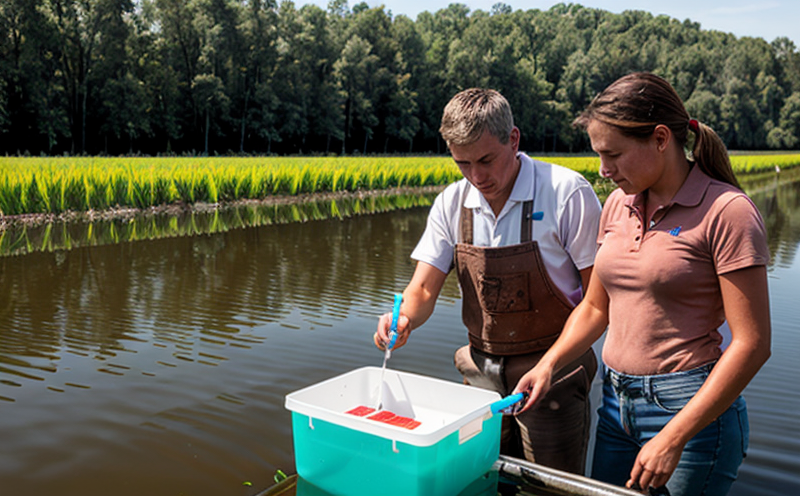Endotoxin Testing in Irrigation Water
The presence of endotoxins in irrigation water used in agriculture and forestry can have significant implications on crop health and yield. Endotoxins are derived from the cell walls of gram-negative bacteria and are potent pyrogens capable of causing fever, shock, and sepsis when ingested or injected into humans or animals. In agricultural settings, endotoxin contamination can lead to plant stress, reduced growth rates, and even crop failure.
Water used for irrigation must meet stringent quality standards to ensure optimal crop health and productivity. Given the critical role of water in agriculture, understanding the presence of endotoxins is essential. The testing process involves several key steps: sampling, extraction, purification, detection using a quantitative method such as the Limulus Amebocyte Lysate (LAL) assay, and final analysis.
The Limulus Amebocyte Lysate (LAL) test is widely accepted for detecting endotoxins. This test measures the presence of endotoxin by using extracts from horseshoe crab blood cells which contain a natural endotoxin-binding protein. The procedure involves several stages: dilution of sample, preparation of reagents, incubation, and finally, reading on an instrument that measures turbidity or fluorescence.
For accurate results, it is crucial to follow the correct procedures for specimen preparation. This includes ensuring proper filtration, pH adjustment if necessary, and avoiding contamination by other microbes. Once prepared, the sample undergoes dilution according to the specified protocol before being introduced into the LAL test reagent. The reaction time varies depending on the method chosen (turbidity or fluorescence), but typically takes between 10-30 minutes.
The LAL assay is sensitive enough to detect even trace amounts of endotoxin, down to concentrations as low as 0.01 EU/mL in some cases. Results are reported quantitatively, providing valuable information about the level of contamination present in irrigation water. Proper interpretation of these results helps farmers make informed decisions regarding treatment options and preventive measures.
Understanding the specific requirements for endotoxin testing is vital to ensuring accurate results. Standards such as ISO 22186:2017 provide guidelines on how to conduct this type of analysis effectively. Adherence to international standards ensures consistency across different laboratories worldwide, promoting trust in test outcomes.
In summary, regular monitoring and proper treatment of irrigation water are essential for maintaining healthy crops free from endotoxin contamination. By implementing robust testing protocols like those described above, agricultural operations can protect their investments while also contributing positively towards sustainable farming practices.
Why It Matters
The importance of conducting thorough endotoxin testing in irrigation water cannot be overstated. Contamination with even small amounts of endotoxins can have detrimental effects on plants, leading to stunted growth and reduced yields. This not only impacts individual farms but also contributes to broader ecological imbalances within ecosystems.
- Reduces plant stress
- Promotes healthier crop development
- Enhances overall agricultural productivity
- Supports sustainable farming practices
By mitigating the risks associated with endotoxin exposure, farmers can improve both short-term yields and long-term sustainability. Properly managed irrigation systems contribute significantly to achieving these goals.
Applied Standards
| Standard Name | Description |
|---|---|
| ISO 22186:2017 | Guide for the Use of Limulus Amebocyte Lysate (LAL) Reagents to Detect Endotoxins in Biological Products and Medical Devices. |
| AAMI T35:2015 | Biological Test Systems and Procedures for Detection of Pyrogens, Bacterial Endotoxins, and Other Pyrogenic Agents. |
Customer Impact and Satisfaction
- Enhanced Crop Health: Regular monitoring helps maintain plant vigor and overall health.
- Increased Productivity: With healthier plants come higher yields per acre.
- Sustainable Practices: Ensures compliance with environmental protection laws while promoting sustainable farming methods.
- Customer Satisfaction: Reliable test results build trust between suppliers and clients, fostering long-term relationships based on mutual success.
A commitment to excellence in endotoxin testing ensures that customers receive accurate and timely information about their irrigation water quality. This dedication translates directly into satisfied customers who can rely on consistent product performance and reliability.





